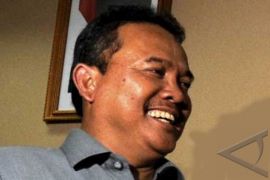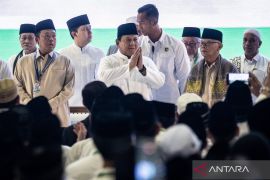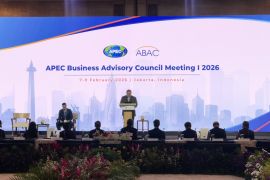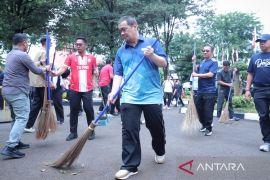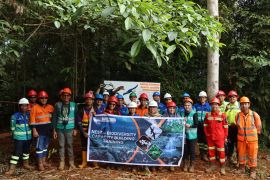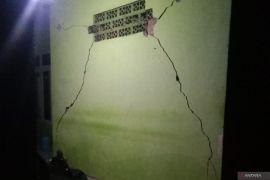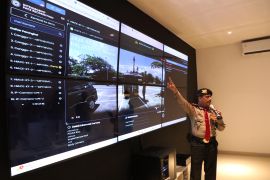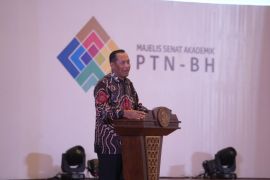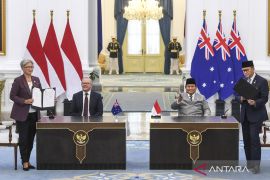International recognition alone is not enough if the biosphere reserves are unable to improve the livelihoods of the surrounding communities,"Jakarta (ANTARA News) - Besides protecting the ecology and biodiversity, the existence of biosphere reserves in Indonesia should also improve the welfare of the communities living around them.
International recognition of the existence of biosphere reserves in Indonesia is actually important for the country to manage forests sustainably but more than that they should improve the livelihoods of the people residing around them.
Responding to the ongoing second International Workshop of South-South Cooperation/SSC-2 in Kampar district, Riau province from October 4 - 8, 2011, Forestry Minister Zulkifli Hasan said in Jakarta on Tuesday that international recognition was important but the more important thing was that the biosphere reserves should be able to improve the local people`s welfare.
"International recognition alone is not enough if the biosphere reserves are unable to improve the livelihoods of the surrounding communities," the minister said, responding to the ongoing workshop.
A total of 18 countries are participating in the workshop to discuss Man and Biosphere concepts in Pekanbaru, Riau province, from October 4 to 8, 2011.
Riau Governor Rusli Zainal said in Pekanbaru that the discussion of Man and Biosphere concepts in the form of cooperation with UNESCO was part of a series of international meeting on South-south cooperation.
"Riau is chosen to host such an international discussion because the province has leading Giam Siak Kecil-Bukit Batu biosphere reserve," Rusli said.
According to him, the participants of the discussion came from countries with tropical rain such as Congo and Brazil, while the others from Japan, China, Taiwan, ten countries from ASEAN, one from Africa, namely Mali, and France from Europe.
The governor said designation of Riau as the host is an honor because Giam Siak Kecil biosphere reserve in the province is the seventh conservation in Indonesia which has been recognized by UNESCO, and the 564th from 109 countries.
UNESCO and the the National Committee of Man and the Biosphere Program in Jakarta in 2009 handed out awards to parties that contributed to the development of Giam Siak Kecil - Bukit Batu (GSK-BB) as the 7th UNESCO Biosphere Reserve in Indonesia.
Recognizing as part of the Sumatra peat swamp eco-region, Giam Siak Kecil-Bukit Batu (GSK-BB) posses a unique habitat and plays a significant role to help sustain populations of rare, endangered and endemic species.
About 189 plant species, consisting of 113 families and 59 genera are recorded in this area, with 29 out of the total number of this plant species are categorized as a protected species under Appendix 1 and 3 of CITES.
According to the forestry minister, one of the issues discussed in the workshop was related to the recognition of seven biosphere reserves in the area of ​​Indonesian forests by UNESCO.
To improve the livelihoods of the people living around the biosphere reserves, Minister Zulkifli Hasan said Forestry Ministry would developed a number of schemes for people plantation forest, village forest, and community forest.
Therefore Zulkifli said Indonesian still needed support and cooperation with international community in the development of biosphere reserves as part of its effort to improve the welfare of surrounding community.
On a separate occasion, Riau Andalan Pulp and Paper (RAPP President Director Kusnan Rahmin noted that conservation efforts and bolstering the livelihoods of communities were the company`s commitment.
Kusnan said that as a business unit of Asia Pacific Resources International Limited (APRIL), RAPP has conducted various studies related to the mapping of high conservation value to maintain the conservation area by involving various stakeholders.
"This is a very good effort to realize a sustainable collaborative management of forests and environment to improve the people`s welfare," he said.
According to him, the involvement of various stakeholders in managing the areas which are identified to have high conservation value will not only help protect the region but also raise their awareness of and participation in forest and environmental conservations.
After opening the second International Workshop of South-South Cooperation/SSC-2 Kampar district, Riau province, the forestry minister said the government of Indonesia also proposed the concept of `bio-village`.
Bio-village concept is offering effective solutions to the problems of poor, particularly those in rural areas, because of its practical utility in addressing the issues faced by rural farmers.
"The Indonesia government proposed the development of communities living in the biosphere reserve region with the concept of bio-village which is expected to be a basis in the management of biosphere reserves in Indonesia and worldwide," Minister Zulkifli said.
According to him the concept of bio-village from Indonesia could be a reference in the SSC workshop that will discuss the follow-up and implementation of a three-year work plan in the period of 2011-2013 that have been decided in the first workshop in Kinshasha, Congo.
The bio-village concept itself is a form of synergy of all the stakeholders whose primary purpose is to reduce carbon emissions from deforestation and is expected to improve the life of residents in the surrounding forest areas.
Zulkifli added the concept has been implemented in Giam Siak Kecil-Bukit Batu reserve biosphere, Riau province which is a collaboration of the administration, businessmen, local people as well as academics.
Zulkifli hoped the private sector engaged in the forestry industry could play a more active role in collaboration of bio-village in the research to empower the local people living in the vicinity of forest areas.
The bio-village concept advocates adoption of eco-friendly technologies and enterprise development based on biological resources that can be used as a tool in addressing the issues of sustainable livelihood and food security.
It provides the poor access to multiple sources of livelihood through skill up-gradation and technological empowerment. (*)
Reporter: Otniel Tamindael
Editor: Aditia Maruli Radja
Copyright © ANTARA 2011
